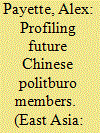|
|
|
Sort Order |
|
|
|
Items / Page
|
|
|
|
|
|
|
| Srl | Item |
| 1 |
ID:
145659


|
|
|
|
|
| Summary/Abstract |
This article examines the Party-State-led Countryside Confucianism experiment based in the rural vicinities of Qufu. There has been, since the 1980s, a renewed interest in Confucianism from both mainland and foreign scholars. More academic to begin with, the focus has recently shifted toward more local and popular groups spreading Confucian teachings across the People’s Republic. This popular resurgence, often described as disjointed and fragmented, has sometimes expressed a more religious or politically charged Confucianism. Recent developments in the Shandong province are now pointing to a more organized—through the involvement of the Party-State—local revival. I argue that this recent government involvement in local Confucian revival comes as a way to compete and reposition itself on the local “cultural market” in order to reinstate its cultural authority over Confucianism, to curb certain practices and possibly restrain the growth of foreign beliefs in the Confucian city of Qufu. This objective of the article is first to document this countryside experience as to frame it in the more general Confucian revival. Furthermore, it will examine its ties to previous rural experiences conducted in Shandong as well as some of its more indirect sociopolitical objectives. To a certain extent, understanding this Party-State-led organized form of local Confucianism will shed light on its renewed role in terms of cultural authority, cultural governance, and local Confucian revival.
|
|
|
|
|
|
|
|
|
|
|
|
|
|
|
|
| 2 |
ID:
112430


|
|
|
| 3 |
ID:
143290


|
|
|
|
|
| Summary/Abstract |
Since the early 1980s, China has witnessed a progressive Confucian revival, especially in the academic and cultural spheres. In particular, since the early 2000s, there has been a progressive expansion of Confucian groups arising from local initiatives all over China in the form of local colleges and study halls. Using four previously unexplored sites, this article studies the multiple modalities of local Confucian revival in the province of Shandong. Through interviews and extensive discussion with members of these groups, we have uncovered a strong adherence to Confucian elements and a convenient religiosity through ritual performances. Therefore, this article not only agrees with previously conducted studies on the revival of Confucianism in China but also adds new empirical elements supporting their conclusions. Finally, this article introduces the ‘Countryside Confucianism experiment’, its current meaning and ties to the ongoing local Confucian resurgence in the province of Shandong as well as its shared identity ‘closure’ characteristics, prevalent among some of these local sites’ narrative.
|
|
|
|
|
|
|
|
|
|
|
|
|
|
|
|
| 4 |
ID:
152342


|
|
|
|
|
| Summary/Abstract |
Efforts at finding the next Politburo members have, since the mid-1970s, been at the center of Chinese Elite and leadership studies. From the late 1980s onwards, leadership selection has become more institutionalized. This allows scholars to narrow down their search to more “propitious” elements in order to try to predict who might ascend to the Politburo. Consequently, this article ponders if it was possible to differentiate these individuals from their less “promotable” counterparts upon their entry into the Central Committee between 1992 and 2012. Based on statistical reassessment of variables commonly found in the literature, the article argues that soon-to-be Politburo members were already displaying a different profile than that of their counterparts 5 to 10 years before their entry into the Politburo. This article does not seek to establish a perfect predictive model rather than circumscribe the profile-type and environment in which these rising Elites can be found. Lastly, the latter opens a discussion on what to expect from the results as well as competing profiles found inside the Central Committee.
|
|
|
|
|
|
|
|
|
|
|
|
|
|
|
|
|
|
|
|
|